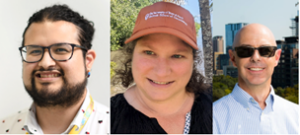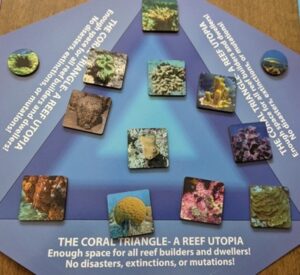Dr. Rowan Martindale, an associate professor at the University of Texas at Austin’s Jackson School of Geosciences, has a passion for studying marine communities, understanding their responses to global changes throughout history, and creating engaging and accessible opportunities for those who want to learn more about the world around them. Dr. Martindale successfully combined her passion, knowledge of marine communities, and desire to innovate to secure the prestigious National Science Foundation™ CAREER grant.
Inspired by the rich sedimentary rock layers found in the Moroccan High Atlas Mountains, Dr. Martindale works to uncover information about marine ecosystem extinction and recovery during the Early Jurassic period. Through her findings, she is able to draw parallels between ecosystem challenges from 183 million years ago to the challenges we see today due to climate change.
Dr. Martindale has also been transforming her research on the impact of rapid global change on marine communities throughout history into educational activities. As part of her CAREER grant, she developed an innovative teaching tool: a board game called “Reef Survivor”, aimed at helping students understand the science of evolution and extinction.
“The NSF CAREER grant not only supports my research but also allows us to develop an engaging educational tool. By integrating the board game into educational modules, we can reach students at different levels and make science more accessible and enjoyable,” said Dr. Martindale.
With her CAREER grant in hand and the successful development of “Reef Survivor” under her belt, Dr. Martindale is prepared to expand the impact of her work through further commercialization by assembling a team to participate in the NSF National I-Corps program. Among her team members are Enrique Reyes, an aspiring entrepreneur, and Frank Coppersmith, the CEO of Smarter Reality and industry mentor for the team. Together, they are embarking on a journey to expand the impact of Dr. Martindale’s research by exploring the opportunity to transform the board game for the digital landscape.

Enrique Reyes, Dr. Rowan Martindale, Frank Coppersmith
Reyes, the entrepreneurial lead, was thrilled about the chance to bring Dr. Martindale’s innovation to the digital realm.
“This board game has the power to make science engaging and accessible for students of all ages. I’m excited to see how we can market and distribute it to maximize its impact,” said Reyes.
Coppersmith, the industry mentor, recognized the game’s potential for success and was impressed by Dr. Martindale’s vision.
“Dr. Martindale’s innovation is not only scientifically significant but also has tremendous educational value. It’s a unique opportunity to bridge the gap between academia and the general public,” said Coppersmith. “Smarter Reality is honored to be a part of this journey.”
The project builds on the existing board game to provide an interactive educational approach. Players can build and protect their own reef ecosystem and test theories in real time, allowing users to engage with complex scientific topics while having fun with their peers.
“Games make it easier to understand difficult concepts,” said Dr. Martindale “People like board games. The goal is that a student might like the game and bring it home to their family, and then you have families learning as well. Now, more than ever, science education is so important. I wanted to make something that would be fun, accessible, and educational.”
Reyes was particularly enthusiastic about the potential impact of the board game.
“As an entrepreneur and educator, I see the immense value in transforming scientific knowledge into accessible and enjoyable educational tools. This board game has the power to inspire a love for science in students and ignite their curiosity about evolution and extinction,” said Reyes.
Coppersmith recognized the game’s potential not only in schools, but in reaching a wider audience.
“The beauty of this board game lies in its potential to engage not only students but also families and the general public. It’s a remarkable opportunity to enhance science literacy and spark conversations about our planet’s past and future,” said Coppersmith.
As the team prepares for the NSF National I-Corps program, Dr. Martindale, Reyes, and Coppersmith are excited to tackle the challenges and opportunities presented by the NSF National I-Corps program. Driven by their shared goal to make science education more engaging, accessible, and impactful, the team is optimistic about the opportunity to navigate uncharted waters on their quest to inspire a passion for science for the next generation of learners.

Reef Survivor Game
“We are excited to participate in the NSF National I-Corps program and have the opportunity to refine our project and build connections with potential partners and stakeholders. This program will provide valuable insights and guidance to help us bring this innovative board game to a broader audience,” said Dr. Martindale.
They understand the challenges ahead but are motivated by their shared vision of making science education more engaging, accessible, and impactful for all audiences.
Learn more about the NSF I-Corps program and apply for the next cohort online. The application process is free, simple, and can be accessed here. For more information and to learn more about the NSF I-Corps program, contact Weston Waldo at weston.waldo@austin.utexas.edu.
Learn more about Smarter Reality here.








